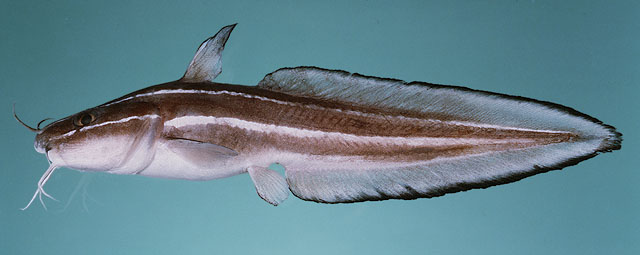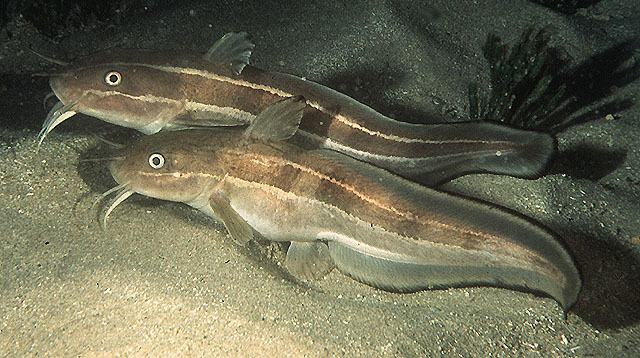| Acipenseriformes | Acipenseridae | Acipenser sturio | native | Sturgeon | |
| Anguilliformes | Anguillidae | Anguilla anguilla | native | European eel | H'anklyss |
| Cyprinodontiformes | Cyprinodontidae | Aphanius fasciatus | native | Samak Ghomoq | |
| Cyprinodontiformes | Cyprinodontidae | Aphanius mento | native | ||
| Atheriniformes | Atherinidae | Atherina boyeri | native | Big-scale sand smelt | Bizhreh 'Hâdy |
| Cypriniformes | Balitoridae | Barbatula panthera | native | ||
| Cypriniformes | Cyprinidae | Barbus longiceps | misidentification | ||
| Cypriniformes | Cyprinidae | Carasobarbus canis | misidentification | ||
| Mugiliformes | Mugilidae | Chelon labrosus | native | Thicklip grey mullet | Boûry Sayloun |
| Cypriniformes | Cyprinidae | Cyprinus carpio carpio | introduced | Common carp | |
| Cyprinodontiformes | Poeciliidae | Gambusia holbrooki | introduced | Eastern mosquitofish | |
| Cypriniformes | Cyprinidae | Garra rufa | native | ||
| Perciformes | Gobiidae | Gobius paganellus | native | Rock goby | |
| Cypriniformes | Cyprinidae | Hypophthalmichthys molitrix | introduced | Silver carp | |
| Mugiliformes | Mugilidae | Liza aurata | native | Golden grey mullet | Boûry Shylân |
| Mugiliformes | Mugilidae | Liza ramada | native | Thinlip grey mullet | Boûry Dhehbân |
| Mugiliformes | Mugilidae | Mugil cephalus | native | Flathead grey mullet | Gharyb |
| Cypriniformes | Balitoridae | Nemacheilus insignis | misidentification | ||
| Cypriniformes | Balitoridae | Nemacheilus leontinae | native | ||
| Salmoniformes | Salmonidae | Oncorhynchus mykiss | not established | Rainbow trout | |
| Cypriniformes | Balitoridae | Oxynoemacheilus angorae | native | Angora loach | |
| Cypriniformes | Balitoridae | Paracobitis tigris | native | ||
| Pleuronectiformes | Pleuronectidae | Platichthys flesus | native | European flounder | |
| Cypriniformes | Cyprinidae | Pseudophoxinus kervillei | native | ||
| Cypriniformes | Cyprinidae | Pseudophoxinus libani | native | ||
| Cypriniformes | Cyprinidae | Pseudophoxinus syriacus | native | ||
| Cypriniformes | Cyprinidae | Squalius lepidus | native | ||
| Perciformes | Cichlidae | Tilapia zillii | native | Redbelly tilapia |
Aquaculture design, modification and equipment supplies. Offshore, onshore, marine and freshwater species. Intensive recirculation aquaculture systems (RAS). Production technology and fish farming techniques. Hatchery and nursery design and management. Organic and sustainable feed alternatives. Feed manufacturing facility design and management. Business planning, analysis, and profitability. Marketing studies, plans and strategies. Comprehensive water analysis.
Sunday, March 11, 2012
List of Freshwater Fishes for Lebanon
Tuesday, March 6, 2012
Newly Discovered Catfish Potentially Fatal to Humans
LEBANON - Experts have warned that catfish which have recently begun migrating to Lebanese waters could be fatal to humans in certain circumstances.
TheDailyStar reports that recent diving operations carried out by divers from the Professional Divers Association in Lebanon and the Civil Defense Marine Rescue Team in the waters near the town of Jiyeh led to the discovery of a catfish sanctuary.
“Their presence in the seabed is beautiful and wonderful,” said diving instructor Maha Hajj, who headed the joint diving team.
Catfish, of which there are many various species, are so called due to the whiskers on their face, three on each side, according to the divers.
“The scene is amazing, catfish swim beside each other like a block of fire,” she told reporters. Ms Hajj said it was likely that this type of fish has come from the Red Sea, saying it was spotted for the first time in Tyre’s seabed over one year ago.
The divers, after carefully monitoring the movement of migrating fish, took photos of the seabed and filmed it with their cameras.
But Ms Hajj warned that the catfish could potentially prove fatal to fishermen. “The intruding fish are capable of stinging and have a harmful poison.”
“There are three thorns on the back and sides of the fish and once it stings, it emits a strong poison in the body of the human being, which might be fatal under some circumstances,” she added.
For his part, Mohammad Sarji, the head of the Professional Divers Association, said that the scientific name for this particular catfish is the Plotosus lineatus, from the Plotosidae family of the species.
“Their presence in the seabed is beautiful and wonderful,” said diving instructor Maha Hajj, who headed the joint diving team.
Catfish, of which there are many various species, are so called due to the whiskers on their face, three on each side, according to the divers.
“The scene is amazing, catfish swim beside each other like a block of fire,” she told reporters. Ms Hajj said it was likely that this type of fish has come from the Red Sea, saying it was spotted for the first time in Tyre’s seabed over one year ago.
The divers, after carefully monitoring the movement of migrating fish, took photos of the seabed and filmed it with their cameras.
But Ms Hajj warned that the catfish could potentially prove fatal to fishermen. “The intruding fish are capable of stinging and have a harmful poison.”
“There are three thorns on the back and sides of the fish and once it stings, it emits a strong poison in the body of the human being, which might be fatal under some circumstances,” she added.
For his part, Mohammad Sarji, the head of the Professional Divers Association, said that the scientific name for this particular catfish is the Plotosus lineatus, from the Plotosidae family of the species.

He explained that catfish cannot survive alone, but rather live in very large groups, with some numbering several hundreds.
This type of catfish seeks shelter in rocky caves, the experts said. Each fish can grow to up to 20 centimeters in length.
“The slogan for this particular fish is ‘examine but don’t touch,’” said Mohammad Mezher, the head of the Civil Defense Marine Rescue Team in the Jiyeh headquarters.
TheFishSite News Desk

Subscribe to:
Posts (Atom)